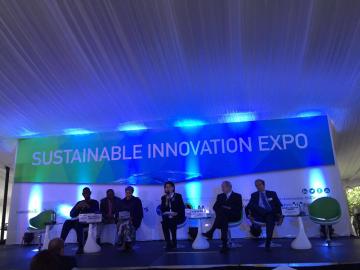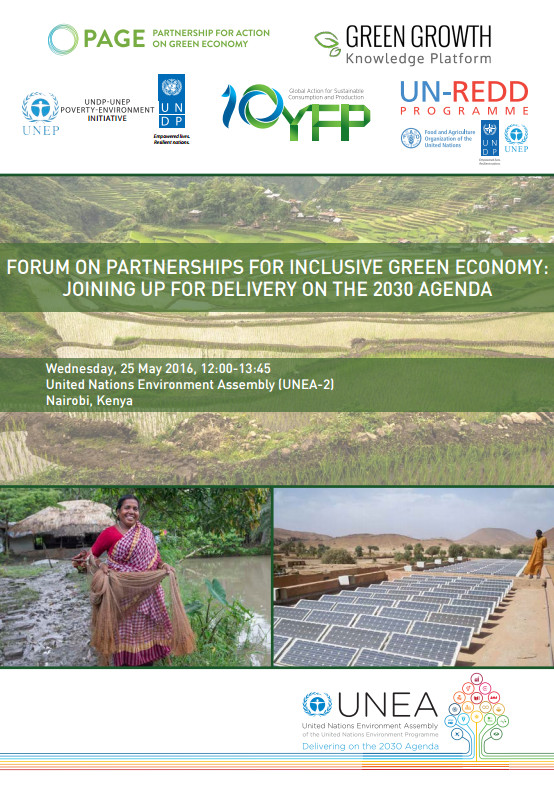
25 May 2016, Nairobi, Kenya – Growing evidence has emerged from countries about the economic, social and environmental benefits that a transition to a greener and more inclusive economy offers for advancing the Sustainable Development Goals (SDGs).
The United Nations Environment Programme (UNEP) and its partners are joining forces to deliver a more coordinated and effective response to member state initiatives designed to drive forward an inclusive green economy. Today, 65 countries have embarked on a path towards an inclusive green economy and related strategies. By transforming their economies into drivers of sustainability, these countries will be primed to take on the major challenges of the twenty-first century - from urbanization and resource scarcity to climate change and economic volatility.
The “Forum on Partnerships for Inclusive Green Economy: Joining up for Delivery on the 2030 Agenda”, which took place today during the second session of the United Nations Environment Assembly (UNEA-2) in Nairobi, Kenya, centered on a high-level panel discussion on how new and innovative partnerships can deliver on the central challenge of the 2030 Agenda: creating the conditions for sustained and sustainable economic growth, with full employment.
The event was organized by UNEP in partnership with the governments of Finland and the Republic of Korea, and co-branded by the Partnership for Action on Green Economy (PAGE), the Green Growth Knowledge Platform (GGKP), the UNDP-UNEP Poverty-Environment Initiative (PEI), the Ten Year Framework of Programmes on Sustainable Consumption and Production Patterns (10YFP), and the United Nations Collaborative Programme on Reducing Emissions from Deforestation and Forest Degradation in Developing Countries (UN-REDD Programme).
 Achieving the SDGs demands stronger, innovative and multi-stakeholder partnerships to mobilise and share knowledge, expertise, technology and financial resources. Both the UN system and national governments have recognized that achieving the goals and targets for the 2030 Agenda will require overcoming sectoral and institutional boundaries, and embracing a more integrated and coherent approach. SDG 17, in particular, calls for innovative partnership to build synergies across silos of expertise. PAGE, GGKP, PEI, 10YFP and UN-REDD Programme are just a few examples of UNEP and its partners joining forces to provide integrated support to member states to achieve the SDGs.
Achieving the SDGs demands stronger, innovative and multi-stakeholder partnerships to mobilise and share knowledge, expertise, technology and financial resources. Both the UN system and national governments have recognized that achieving the goals and targets for the 2030 Agenda will require overcoming sectoral and institutional boundaries, and embracing a more integrated and coherent approach. SDG 17, in particular, calls for innovative partnership to build synergies across silos of expertise. PAGE, GGKP, PEI, 10YFP and UN-REDD Programme are just a few examples of UNEP and its partners joining forces to provide integrated support to member states to achieve the SDGs.
Bringing together the expertise of five UN agencies — UNEP, ILO, UNDP, UNIDO and UNITAR — and working closely with national governments, private sector and civil society, PAGE currently contributes to the shift of national economic structures in eight countries towards clean technologies, resource-efficient infrastructure, green skilled labour, good governance and well-functioning ecosystems. PAGE expects to assist an additional 12 countries, bringing the total up to 20 by 2020.
Over the last 10 years, PEI has successfully supported this work to contribute to poverty alleviation through strengthened management of the environment and natural resources and an inclusive green economy in 30 countries around the world.
The UN-REDD Programme, an inter-agency programme by UNEP, the UN Development Programme (UNDP) and the Food and Agriculture Organization of the UN (FAO), is working with more than 60 partner countries to reduce emissions from deforestation and forest degradation, but also to stimulate conservation, sustainable management of forests and enhancement of forest carbon stock.
With the adoption of the 2030 Agenda for Sustainable Development and the success of the Paris Climate Summit in 2015, the GGKP’s objectives of encouraging widespread collaboration, addressing knowledge and data gaps, and supporting practitioners and policymakers with the latest analysis and data, are more relevant and necessary than ever. Furthermore, the GGKP web platform draws together over 2,000 knowledge products from more than 300 leading organisations, making it the largest existing source of green growth knowledge.
As a backdrop to the discussion among policy makers and agency leaders in this field, the event also served as a forum for launching the UNEP’s new publication, “Uncovering Pathways to an Inclusive Green Economy: A Summary for Leaders”, a synthesis report built on UNEP's earlier green economy work, which speaks to the multiple benefits - economic, health, security, social and environmental - that such an economic model can bring to humanity.
The forum featured the participation of Ministers of Environment and high-level representatives from Burkina Faso, Finland, Republic of Korea, Peru, Mongolia and Nigeria, as well as the United Nations Environment Programme Executive Director, Achim Steiner; the Director for Sustainable Development, Bureau for Policy and Programme Support of the United Nations Development Programme; Nik Sekhran, and the Director General, DG Environment for the European Commission, Daniel Calleja Crespo.
During the event, countries were offered a platform to inspire others by sharing their knowledge, best practices and lessons learned on breaking down silos and deploying inclusive green economy frameworks to develop integrated approaches to sustainable development.
